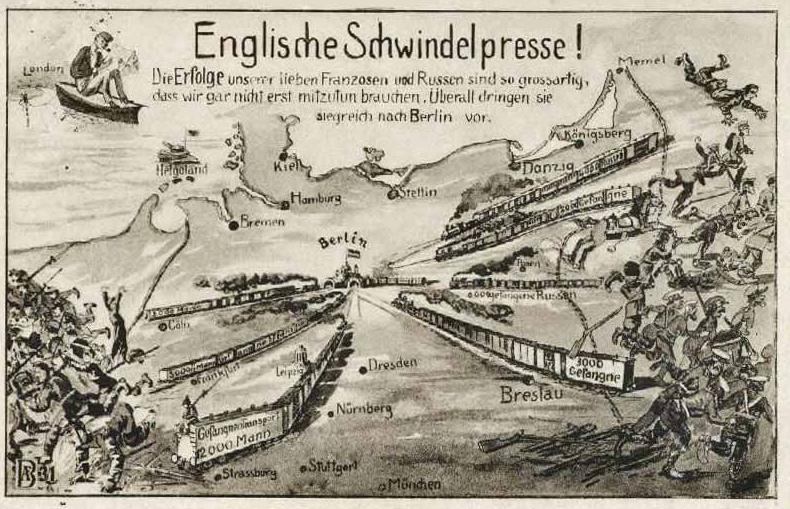
World War I: German Propaganda

Figure 1.--This German postcard shows two themes in German World War I propaganda. German forces in the East and West are driving back the allies and taking thousands of Allied soldiers prisoners and brining them back to Germany. This illustrates one German propaganda theme, the idea that Germany had the strongest military and the best soldiers. That was not altogether inaccurate, but the speriority was not so large that Germany was able to wage a two front war against countries with larger populations and greater resources. The other theme is that
The British were allowing the French and Russians to to the fighting for them. The caption read, "Englische Schwindelpresse! Die Erfolge unserer lieben Franzosen und Russen sind so grossartig, das wir gar nicht erst mitzutun brauchen. Überall dringen sie siegreich nach Berlin vor." That translates as, "English dumbbell press! The achievements of our dear French and Russians are so great that we do not even need to contribute. Everywhere they penetrate victoriously to Berlin." We are not sure when this postcard was producd, but are guessing it was fairly early in the war.
|
|
German wartime propaganda was often ham fisted compared to British propaganda, generally seen as the most effective propaganda of the War. The propaganda durected at foreign audiences, especially the all important American audience was nothing short of disaterous. This was perhaps inevitable given tht the war began with the German invasion of small, neutral Belgium. But there was one German action after another (starving the Belgians, war crimes in Belgium, sinking ocean liners, unrestricted submarine warfare, introducing poison gas, the Zimmerman Telegram, sabotage, etc, for which no amount of propaganda could answer. Thus what mattered most was German domestic propagada designed to justify the War and maintain support for the war effort. Here Germany held an advantage. There were social and cultural influences that predisposed the German people to support Kaiser Wilhelm’s call to arms. Compare that to the overwealming American predisposition to stay out of the War. And the fact that the war began with invading a small neutral country (Belgium) does not seem to have impacted public support of the War. The Prussian monarchy and military had acgieved what Germany was unavle to achive for more than a mellinum--unification. This confered enormous prestige to both and a willingness to obey and support both. Historians describe how Germany’s dominant bourgeois society saw obedience, loyalty, bravery and discipline as laudable characteristics and as both patriotic and appropriate for the German Volk. [Rohkrämer, p. 761] Socialist voices question this national view, but they were not the dominant national view. Nationalist and Social Darwinist views also influnced Germans perrceptions that conflict was inevitable. [Nübel, pp. 23ff.] Here a major factor was the widely held view that Germany was not being given its due (such as colonies) and suffiently respected by the other great powers. Here the legacy of Bismarck, the Iron Chancellor and his 1862 Blut and Eisen speech had a profound influence on the German psyche. (Unfortnately his more moderate diplomacy was less influential.) The idea that political power is based on struggle led to the widely held outlook that only armed conflict could guarante Germany's security, even survival. [Nübel, p. 23.] The comment by German Chancellor Alfred von Bethmann-Hollweg that Britain had declared war 'just over a scrap of paper' (meaning the Treaty of London guaranteeing Belgian existence, neutrality, an sovereignty. This attitide over treaties vividly illustrated prevaleny German attitudes. Von Bethmann-Hollweg was not Hitler, but an educated man well within the German mainstream. This omment became a mainstay of British propgnda. Many will recognize these attituds as central to Hitler's thinking helping to explain his appeal two decades later. The French-Russian Entente fed into the idea of a concern with threat and encirclement by dangerous neigboring states. [Mai, p. 585.] These attitudes were most prevalent among conservatives, but such was the power of nationlislm, there was support for them among the socialist-oriented working lass as well. The Social Democratic Party (SPD) split on such issues and arms spending before the War. This was the atmosphere in which German war-time propaganda operated. Only terrible losses and privations would change such strongly held attitudes. One phenomnon that played out in Germany was that the Germans believed that with the collapse of Russia that they had won the War. Then suddenly because of the Kaiser's incredably incompetent foreign policy, over the spaves of only 4 months, Allied armies in the Wet bolstered by the Americans defeated the German Army and forced a humiliating armistice.
Sources
Mai, Gunther. "'Verteidigungskrieg' und 'Volksgemeinschaft' Staatliche Selbstbehauptung, nationale Solidarität du soziale Befreiung in Deutschland in der Zeit des Ersten Weltkriegs (1900 – 1925)" in Michalka ed. Weltkrieg (1994).
Nübel, Christoph. "Bedingt kriegsbereit: Kriegserwartungen in Europa vor 1914," in Apuz. Aus Politik und Zeitgeschichte 63/12 (2013)
Rohkrämer, Thomas. "August 1914: Kriegsmentalität und ihre Voraussetzungen," in Wolfgang Michalka, ed. Der Erste Weltkrieg: Wirkung, Wahrnehmung, Analyse (1994).
CIH

Navigate the CIH World War I Page:
[Return to Main World War I Propaganda page ]
[Return to Main World War I German page ]
[Return to Main World War I page]
[Aftermath]
[Alliances]
[Animals]
[Armistace]
[Causes]
[Campaigns]
[Casualties]
[Children]
[Countries]
[Declaration of war]
[Deciding factors]
-------[Diplomacy]
-------[Geo-political crisis]
[Economics]
[Home front]
[Intelligence]
[Military forces]
[Neutrality]
[Pacifism]
[People
[Peace treaties]
[Propaganda]
[POWs]
[Russian Revolution]
[Signals and intelligence]
[Terrorism]
[Trench warfare]
--------[Technology]
[Bibliographies]
[Contributions]
[FAQs]
[Images]
[Links]
[Registration]
[Tools]
[Return to the Main World War II page]
Created: 8:16 PM 3/6/2018
Last updated: 8:16 PM 3/6/2018



